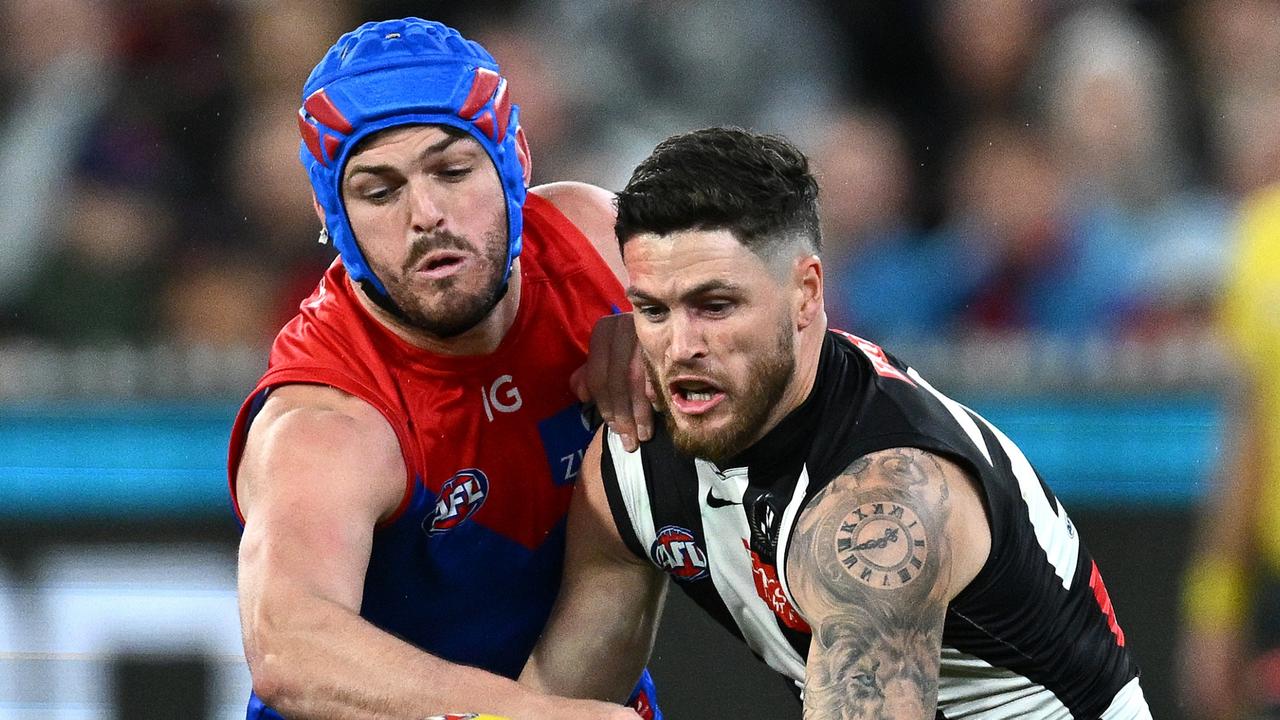The AFL has chosen to keep the forced break after a concussion at 12 days – but only at the elite level, with all other footballers forced into a minimum 21-day absence.
The league realised its 2024 concussion protocols on Wednesday evening, declaring the extra medical care and management seen for AFL and AFLW players means an extended break is not required.
Players will again miss a minimum of 12 days after a concussion, though they will still need to pass the 11-step protocol to return to the field. Last season 29% of male players, and 24% of female players, missed more than one match after a concussion.
The only place to watch every game of AFL’s Opening Round is Fox Footy, available on Kayo. New to Kayo? Start your free trial today >
The dramatic Angus Brayshaw incident in last year’s finals, which led to his medical retirement last month, and the growing understanding of the impact of brain injuries had some experts calling for a longer period on the sidelines than 12 days.
But the league said: “The different positions for elite football (i.e. AFL and AFLW only) and all other levels of Australian Football reflect the differences in the level of medical resources that are generally available at the elite level of the game that generally do not exist to the same degree in other competitions.
“Players in our AFL and AFLW competitions will have the benefit of “Advanced Care Settings” (within the meaning of that term in the AIS Statement) to closely monitor their recovery and progression through the minimum 12-day protocol. Then, reflecting the position that generally exists on medical resources available at lower levels where there is usually not the same level of constant care as elite football, a longer “guardrail” requiring a longer minimum rest and recovery period is built into the minimum 21-day protocol.”

While the Australian Institute of Sport called for all players under the age of 19, including those at the elite level, to be kept off the field for 21 days the league said it was “impractical to have different mandatory return to play protocol for different age groups in our elite football competitions.
“Having said that, the 2024 AFL and AFLW Concussion Guidelines make it very clear that younger players sustaining a concussion must be treated more carefully and conservatively than older teammates and competitors.”
It added: “In a landmark decision, all other Australian Football competitions at all ages (i.e. adult/open competitions and all junior competitions), will adopt a mandatory minimum 21-day return to play protocol. This new protocol will apply for State Football competitions (including the VFL and VFLW), elite pathway competitions (including the Coates Talent Leagues for boys and girls) and all community football competitions. The AFL will work with all Leagues and football bodies, including the Western Australian Football Commission and the South Australian National Football League, to encourage the universal adoption of this important benchmark position in our sport in all States and Territories.
“Under the new community football guidelines, the earliest that a player suffering a concussion can return to play is on the 21st day post the concussion incident provided they get medical clearance.
“The new community football guidelines and the elite football guidelines are in-step with the recent Australian Institute of Sport’s Concussion and Brain Health Position Statement regarding return to play protocols post-concussion. The full details of the new community football guidelines will be released in the coming weeks ahead of the community football seasons.”
Other changes include:
– In the event of “probable motor incoordination/no protective action”, the ARC Medical Spotter (an independent doctor) can now compel that the player be removed for a SCAT;
– The integration of the SCOAT6 (being the Sport Concussion Office Assessment Tool) (ie “Office” as opposed to “Sideline”) which is used to assess a player’s recovery from concussion from 72 hours after the concussion;
– Changes to the content of the Stage 2 Recovery phase of the return to play protocol which provides Clubs with some more flexibility in the activity that the recovering player may undertake in that period whilst still symptomatic (noting that the Amsterdam Consensus Statement permits more controlled activity for a player recovering from a concussion and still experiencing some symptoms)
– Expansion of the section relating to the management of difficult or complicated cases which, amongst other things, makes it clear that repeated concussions must be reported to the AFL Chief Medical Officer;
– Expansion of the section re the work of AFL Concussion Panels to clarify the process and purpose of Concussion Panels to assist players in clubs in dealing with complex cases of concussion.